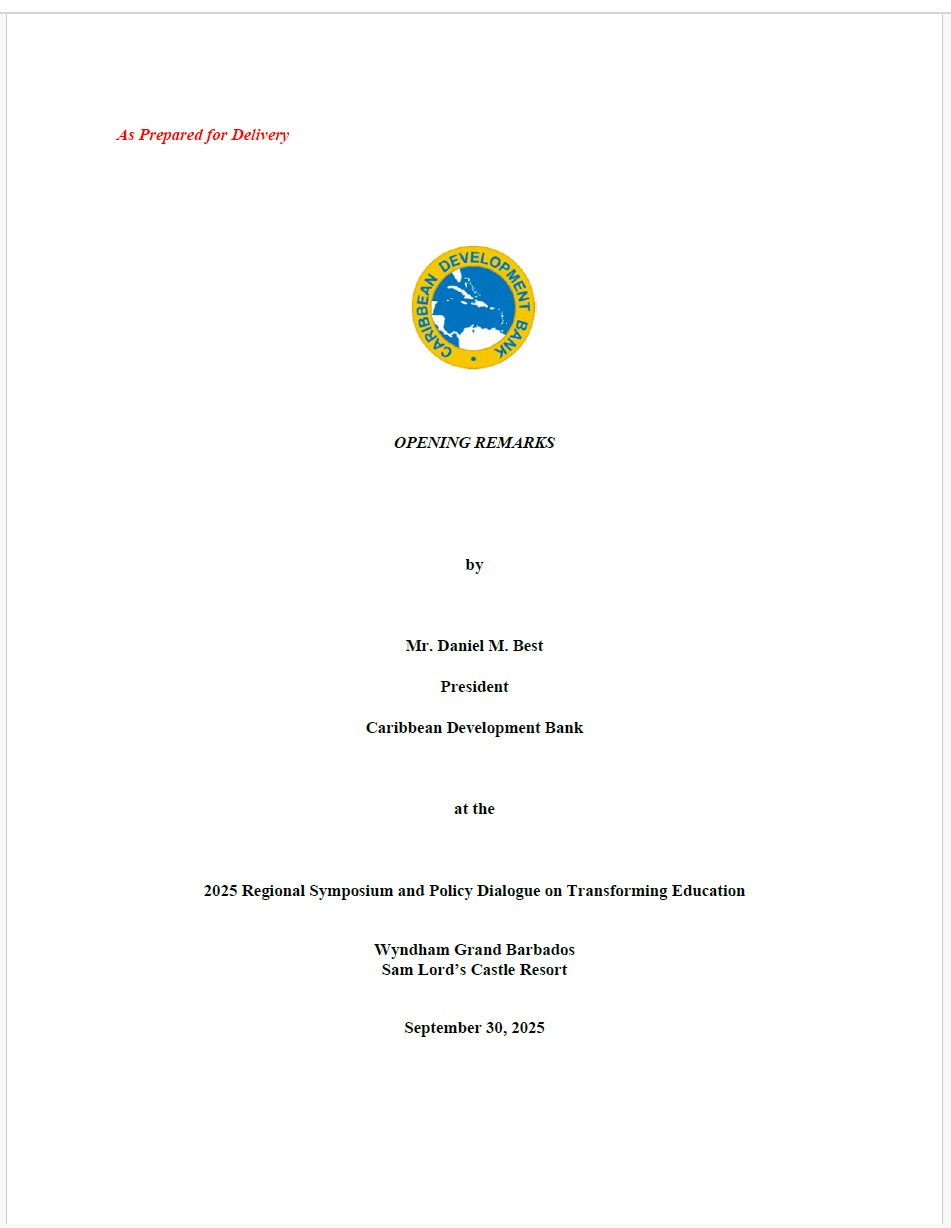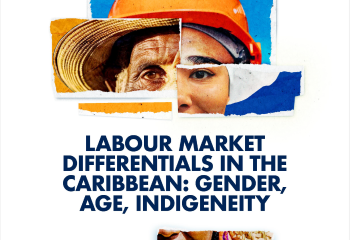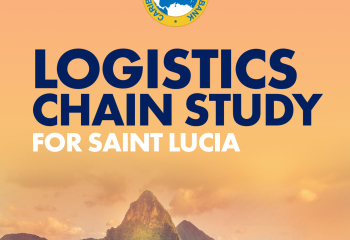Opening Remarks -2025 Regional Symposium and Policy Dialogue on Transforming Education

The Caribbean is one of the youngest Regions in the world, with nearly 60% of our people under the age of 30. This means our youth are not just our future; they are our greatest asset today. Across our Region, we see perseverance, creativity, and boundless potential ready to be unlocked. This potential fills us with hope and optimism for the future. That is why this gathering is so important. The future we envision for our youth will be shaped by the choices we make today. It is with that sense of urgency and purpose that I welcome you to the Caribbean Development Bank's Second Regional Transforming Education Symposium and Policy Dialogue, in collaboration with the Ministry of Educational Transformation, Barbados - a space where, together, we will chart reforms our region needs to secure that future.
In preparing for this Symposium, I returned to the vision of Sir Arthur Lewis, Nobel Laureate, founding architect of the Caribbean Development Bank, and our first President. He emphasised that “the fundamental cure for poverty is not money but knowledge.” He was right then, as he is now. Sir Arthur recognised that education is the deciding factor between a Caribbean that lingers on the margins of the global economy and a Caribbean that leads, as innovators, creators, and builders of prosperity.
The global record is unequivocal. Over the last four decades, global gross domestic product per capita has nearly doubled, and the share of humanity living in extreme poverty has decreased from 44% in 1981 to just 9% in 2022, marking the most significant poverty reduction in human history. At the heart of this transformation? Education. Research shows that it accounted for half of global economic growth since 1980, and two-thirds of income gains among the world’s poorest people. The takeaway is unmistakable; education is the most powerful driver of inclusive growth known to humanity.
Building on the Caribbean’s Education Legacy
This truth is deeply embedded in our own history. For generations, Caribbean parents and grandparents sacrificed, stretched scarce resources, walked miles, and leaned on their communities to ensure their children could enter a classroom. Many of us here today are direct beneficiaries of their determination. Our Region’s progress rests squarely on their belief in the power of learning.
Now, it is our turn to honor their sacrifices by transforming our systems to meet the challenges of our time. Because, colleagues, the reality is sobering:
-
Fewer than one in five adults in the Caribbean hold a university degree.
-
Girls dominate tertiary education, yet this success is not matched in leadership roles or pay equity.
-
Boys are exiting the education pipeline too early, with lasting effects on their well -being and society.
-
This year (2025), 44% of CSEC candidates passed five or more subjects, including Mathematics and English – still very much below what we can consider satisfactory.
-
While we continue to produce brilliant minds, too many migrate in search of opportunity, with some countries losing more than 70% of their university graduates.
My friends, weak outcomes block the dreams of families and constrain our region’s growth. They erode social cohesion and deepen cycles of inequality.
An invitation to a Bold Future
So, I invite you to imagine with me a transformed Caribbean. A Region where education is a launchpad for innovation, resilience, and global leadership. A Caribbean where:
-
Lifelong learning is guaranteed through skills certificates and reskilling pathways.
-
Young innovators harness AI and robotics to design platforms that transform the way the world learns, heals, trades, and connects.
-
Universities and TVET institutions fuel breakthroughs in renewable energy, climate resilience, and digital entrepreneurship.
-
Our hubs of trade are models of sustainability, and our scientists lead in marine biotechnology and clean energy.
-
Tourism is redefined as sustainable, agriculture is transformed by agro-tech, and our blue economy becomes the Silicon Valley of the Seas.
-
Most importantly, where our brightest young people no longer feel they must leave the Caribbean to succeed.
This is the transformation we must urgently harness, and it begins with how we invest in education development today.
The Role of Parents, Communities, and Policymakers
Colleagues, let us do this together. Education is a journey that begins long before the first school bell. Parents are the first teachers, the ones who instill values, build resilience, and sustain learning at home. Every child's success story is a testament to the unseen labor of a mother or guardian, the faith of a father, and the resilience of grandparents who held onto the promise of education against all odds. Policymakers can craft a vision and strategy, but it is parents who bring these principles to life, making them an indispensable part of the education system. One cannot succeed without the other.
In our Region, it has always taken a village to succeed. It will take the whole Caribbean village, including parents, teachers, communities, policymakers, and the diaspora, to raise this generation into prosperity. That is why parents must have a seat at the table of transformation.
Through stronger Parent-Teacher Associations, regional alliances, and community networks, we are embedding parents’ voices alongside policymakers in decisions that will shape Caribbean education for decades to come. At this critical juncture, we have a unique opportunity to strengthen the entire education ecosystem by vigorously advancing the participation of parents. Over the next few days, I invite us to rethink how we engage, yea empower, parents as partners with formal roles, clear access points, and enshrined rights in shaping the future of education.
To guide our conversation, I propose what I call The Big Four Agenda for Parents. This Agenda, which focuses on Parents as Partners, Protecting every child's right to learn, Preparing children for the future, and Passing on a legacy of opportunity, will serve as a roadmap for our discussions and actions.
-
Parents as Partners and co-architects, embedding their voices through School Parent-Teachers Association and a regional Council of National Parent-Teacher Association, which we will launch at this Symposium, ensuring that parents are engaged in thought leadership, in school connectedness and education policy decisions.
-
Protect every child’s right to learn and thrive, regardless of circumstance, and have access to safe, inclusive, and quality education through increased daily engagement with the school by our parents.
-
Prepare children for the future by giving them confidence to learn, equipping them for green jobs, digital economies, cultural industries, and a world of constant disruption, while also building the capacity of our parents to keep pace and engage meaningfully with these rapid changes.
-
Pass on a legacy of opportunity, ensuring that education creates generational prosperity, so every child inherits a stronger foundation than the one before.
The Role of the Bank
The Caribbean Development Bank will be right there alongside you, our policymakers, parents, students, educators, and partners. Under our Rebirth Vision, we are designing a new education policy and strategy that will bolster the education ecosystem and further strengthen parent-teacher partnerships, building on our track record to:
-
Ensure the basics, so that by Grade 3, every Caribbean child can read, count, think critically, and navigate the digital world with confidence.
-
Cultivate future skills for renewable energy, resilient construction, agro-tech, health tech, the creative economy, and the digital frontier.
-
Integrate adaptive and AI-augmented learning to personalise education and lift performance.
-
Build a Caribbean Digital Education Ecosystem, providing equitable access to devices, connectivity, assistive technology, shared learning repositories, and governance frameworks linking classroom to career.
-
Deepen research and innovation linkages, turning universities into engines of discovery for the blue and green economies, fintech, and cultural industries.
-
Empower teachers and leaders with training in pedagogy, digital integration, and ethics, enabling them to guide innovation.
-
Champion equity and inclusion, keeping boys engaged while ensuring girls’ academic gains translate into leadership and opportunity.
-
Link education to jobs and lifelong learning through micro-credentials, modular qualifications, and demand-driven competency-based skills.
-
Support parents directly by facilitating the Regional Council of National Parent-Teacher Association, strengthening advocacy, capacity, and cross-country collaboration.
-
Ensure accountability through a live, transparent Caribbean Education & Skills Dashboard that tracks progress in real time.
Our goal is to build ladders of opportunity across generations and create a sustainable legacy of prosperity for our people.
Closing: Passing the Torch
Colleagues and friends, knowledge is the capital that never depreciates. Those who came before us were sure of this and they lit the torch of education in the darkest of times. Our parents kept it burning with sacrifice and resilience. Today, it rests in our hands. The question is, will we let it flicker, or will we raise it high enough to light the path for every Caribbean child? Let us lift it high, ensuring that no dream is too bold, and no horizon too distant, for our region to reach its full potential.
Let us get this right, and we will ensure that the Caribbean’s best days are always ahead of us.



